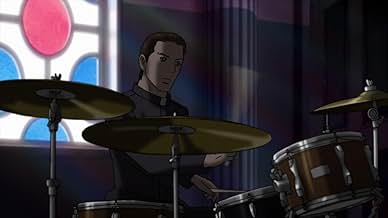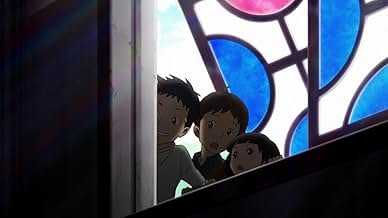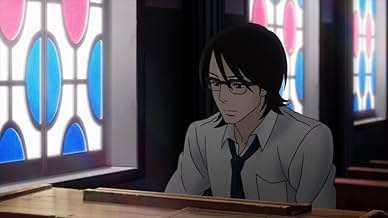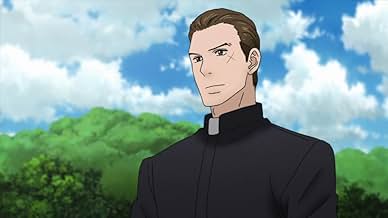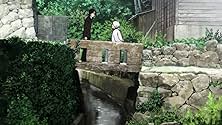NOTE IMDb
8,1/10
3,7 k
MA NOTE
Ajouter une intrigue dans votre langueTwo different students - a successful but aloof academic and a rebellious but kindhearted delinquent - form a friendship through their love for music.Two different students - a successful but aloof academic and a rebellious but kindhearted delinquent - form a friendship through their love for music.Two different students - a successful but aloof academic and a rebellious but kindhearted delinquent - form a friendship through their love for music.
- Récompenses
- 1 victoire et 2 nominations au total
Parcourir les épisodes
Avis à la une
One might expect something a bit different for Shinichiro Watanabe's first anime series in ages. Rather than the kind of genre-fusion madcap adventures for which Watanabe became famous for (Cowboy Bebop and Samurai Champloo), Kids on the Slope is a gentle coming-of-age drama about a pair of teenage boys who don't fit in and find release through jazz music. Well, it's not that much of a surprise if you saw his short film Baby Blue, but it's still worth applauding such a doggedly realist show in a medium that specializes in flights of fancy.
Indeed, Kids on the Slope is at its best when it flows with the languorous, irregular rhythm of jazz, letting us soak in the aesthetics and hang out with its characters. The animation is beautifully done, and the music is of course excellent (and what's more, we actually see the characters playing the notes -- no Nodame Cantabile-esque still frames here). The attempts to interject drama, especially towards the back half of the series, take away from this appeal a bit, but even at its most serious Kids on the Slope is never melodramatic.
The main attraction here is the relationship between Kaoru and Sentaro, a curious mix of friendship, rivalry, and admiration. They drag each other towards something approaching adulthood, even if there's always a distance between them. Anime has plenty of shows about male-male bonding, but few have a central relationship as complex as this one. Ritsuko, the third wheel to this bromance, is handled less well and never really comes off as more than a love interest.
Along the way there are historical subplots, moments of ambiguous redemption, a hilarious wannabe pop band, and more jam sessions than you can shake a drumstick at. It doesn't live up to Cowboy Bebop, but nothing does, and unlike Samurai Champloo, Kids on the Slope doesn't really try. Instead, it's its own thing, strange and a little funky, but ultimately pretty enjoyable.
Indeed, Kids on the Slope is at its best when it flows with the languorous, irregular rhythm of jazz, letting us soak in the aesthetics and hang out with its characters. The animation is beautifully done, and the music is of course excellent (and what's more, we actually see the characters playing the notes -- no Nodame Cantabile-esque still frames here). The attempts to interject drama, especially towards the back half of the series, take away from this appeal a bit, but even at its most serious Kids on the Slope is never melodramatic.
The main attraction here is the relationship between Kaoru and Sentaro, a curious mix of friendship, rivalry, and admiration. They drag each other towards something approaching adulthood, even if there's always a distance between them. Anime has plenty of shows about male-male bonding, but few have a central relationship as complex as this one. Ritsuko, the third wheel to this bromance, is handled less well and never really comes off as more than a love interest.
Along the way there are historical subplots, moments of ambiguous redemption, a hilarious wannabe pop band, and more jam sessions than you can shake a drumstick at. It doesn't live up to Cowboy Bebop, but nothing does, and unlike Samurai Champloo, Kids on the Slope doesn't really try. Instead, it's its own thing, strange and a little funky, but ultimately pretty enjoyable.
Much more emotional and earthly than Shinichirō Watanabe's previous works... why, yes there are several reasons for that....first ,the characters are high school students ,more like makato sinkai's characters...second ,they show a deeper level of love and friendship among them which is very naive ... third, the music and the soundtracks used in the whole series...
Yoko Kanno joined Watanabe for the third time and together they created a magical musical journey... direction is not edgier as that of cowboy bebop or samurai champloo but still its great... highly recommendable... my ratings-9/10
Yoko Kanno joined Watanabe for the third time and together they created a magical musical journey... direction is not edgier as that of cowboy bebop or samurai champloo but still its great... highly recommendable... my ratings-9/10
I started watching this anime as i thought it would similar to "your life in April " but it has more than that, after watching this one would definite start liking jazz music too. The emotions and types love have been well framed and all the characters were interesting. so much emotions have been put on all the characters, I like how well they have presented the bond of friendship between the main characters, makes think about my old schools friends too. Not for a single minute i felt that story is dragging. the motion and feelings of the characters were so natural doesn't feel like watching it on screen, it was more like experiencing it and you might relate it with story to. give this anime a shot you feel disappointed.
The anime has a total of 12 episodes and was broadcast between April and June in 2012. The story begins with a high school boy (Kaoru Nishimi) who moves to Saseho in Nagasaki prefecture due to his father's business matter. Kaoru is the best student at his previous school but he doesn't fit into the environment and doesn't have friends because of his frequent changes of schools. After he meets a problem kid and a Jazz drummer, Sentaro, Kaoru finds a light in his school life. As Kaoru is a classic pianist, he starts playing Jazz under Sentaro's influence. Soon after Kaoru falls in love with Ritsuko, Sentaro's childhood friend. However, Kaoru is rejected because he finds out that Ritsuko's favourite person is Sentaro. Meanwhile, Ritsuko also notices that Sentaro comes to like a mysterious upperclass student, Yurika. Yurika loves Junichi who is a saxophone player and comes back from Tokyo after joining a student movement and is renounced by his father.
Love and relationship are unpredictable just like jams and Jazz improvisations, and they are leaping impulses and swinging like a person running down a slope. Each episode is composed of a small story along with a Jazz song such as "Someday My Prince Will Come," "Now's the Time," "Moanin," "Summertime," etc. The story is a really heartwarming. Perhaps, the time background of the story in the 1970s, where people listen to records, no musical score, transcriptions of songs, student movements, and people, makes the viewer feel warm. Above all, the music is brilliant! Yoko Kanno worked on the songs; the arrangement of Jazz songs, and the jams and improvisations are top-notch! I highly recommend this anime, and you will find passion and bittersweet in the story.
Love and relationship are unpredictable just like jams and Jazz improvisations, and they are leaping impulses and swinging like a person running down a slope. Each episode is composed of a small story along with a Jazz song such as "Someday My Prince Will Come," "Now's the Time," "Moanin," "Summertime," etc. The story is a really heartwarming. Perhaps, the time background of the story in the 1970s, where people listen to records, no musical score, transcriptions of songs, student movements, and people, makes the viewer feel warm. Above all, the music is brilliant! Yoko Kanno worked on the songs; the arrangement of Jazz songs, and the jams and improvisations are top-notch! I highly recommend this anime, and you will find passion and bittersweet in the story.
Shinichiro Watanabe is as close to a cult anime director as you get and with Kids on the Slope he addresses directly the stylistic thread that runs through everything he does, music.
Kaoru Nishimi is the buttoned down, classically trained protagonist, carrying his emotions bundled up in his suitcase through an endless carousel of schools and communities. Never having time for friends or even acquaintances, and drawing his only pleasure from the structured performance of classical piano. The series begins with the door to his sheltered existence creaked open by the self-styled drummer Sentaro Kawabuchi. In a cacophony of fists, romance, and blaring jazz, Sentaro awakens Kaoru to the wonders of expression.
Shinichiro Watanabe, along with composer Yoko Kanno, has sketched a nostalgic portrait of 60s Japan, and in what i'm sure are touches of autobiography shown an adrift young man find a home in the beautifully flawed world of jazz. Watanabe draws his characters with a loving hand, appreciating nuance and weakness as part and parcel, however this adoration can sometimes come across as sentimentally watery. But the show is made with a joy that leaps out from every vivid image and roaring musical number, that would suppress any criticism in sheer enthusiasm.
Drawing from the American Beatniks and his own experience Watanabe produces a delicate character play enriched by one of the finer soundtracks i've heard.
Kaoru Nishimi is the buttoned down, classically trained protagonist, carrying his emotions bundled up in his suitcase through an endless carousel of schools and communities. Never having time for friends or even acquaintances, and drawing his only pleasure from the structured performance of classical piano. The series begins with the door to his sheltered existence creaked open by the self-styled drummer Sentaro Kawabuchi. In a cacophony of fists, romance, and blaring jazz, Sentaro awakens Kaoru to the wonders of expression.
Shinichiro Watanabe, along with composer Yoko Kanno, has sketched a nostalgic portrait of 60s Japan, and in what i'm sure are touches of autobiography shown an adrift young man find a home in the beautifully flawed world of jazz. Watanabe draws his characters with a loving hand, appreciating nuance and weakness as part and parcel, however this adoration can sometimes come across as sentimentally watery. But the show is made with a joy that leaps out from every vivid image and roaring musical number, that would suppress any criticism in sheer enthusiasm.
Drawing from the American Beatniks and his own experience Watanabe produces a delicate character play enriched by one of the finer soundtracks i've heard.
Le saviez-vous
- AnecdotesThe series title "Sakamichi no Apollon", means "Apollo of the Slope". Apollo is the Greek god of music.
- Crédits fousEach episode is named after a jazz song.
- ConnexionsFeatured in WatchMojo: Top 10 Slice of Life Anime (2018)
Meilleurs choix
Connectez-vous pour évaluer et suivre la liste de favoris afin de recevoir des recommandations personnalisées
Détails
- Durée
- 24min
- Couleur
Contribuer à cette page
Suggérer une modification ou ajouter du contenu manquant




